Collaborating with Stakeholders

Executive Summary: #HRCMONDAYS - Speaker Series
Objective: This case study explores how the Human Rights Campaign (HRC) redefined its monthly fundraising event, #HRCMONDAYS, in collaboration with Chino Chinatown to improve member participation and community engagement. The goal was to create a more inclusive and impactful event series, leveraging local organizations and speakers to increase attendance and raise funds, all while fostering stronger relationships within the LGBTQ+ community.
Role: I served as Event Organizer, Speaker Coordinator, Graphic Designer, and Social Media and Print Media Marketing Strategist, responsible for coordinating the event's logistics, promoting the series, and managing speaker relations.
Participants: HRC Members, Prospective Members, and Community Leaders from partner organizations.
Stakeholders:
-
Primary Stakeholders: HRC Members, Chino Chinatown Staff (Bartenders, Chef, Hostess, Manager), HRC Leadership
-
Secondary Stakeholders: Bystanders Dining at Chino Chinatown
-
Key Stakeholders: HRC Board of Governors, Board of Directors, Chino Chinatown Owner
Research Methods:
-
Participatory Observation: We observed three #HRCMONDAYS events to assess participant engagement, identify issues, and understand the event’s strengths and weaknesses.
-
Surveys: Surveys were distributed to HRC leadership, volunteers, and attendees to gather insights on event challenges, such as volunteer burnout and low participation.
-
Scenario Development: Helped create a vision for the future of #HRCMONDAYS by conceptualizing a “Mixer with a Purpose” format focused on community causes and local organizations.
-
Service Design: Mapped out the full #HRCMONDAYS experience, ensuring event logistics, speaker coordination, and marketing strategies were aligned with stakeholder needs.

Key Learnings:
-
Identifying primary and secondary stakeholders was key to success, including HRC members, Chino Chinatown staff, and HRC leadership.
-
I presented a mutually beneficial partnership to secure buy-in, with HRC attracting a diverse audience and Chino Chinatown providing free space and sharing Equality Vodka sales.
Challenges & Solutions: Low attendance initially prompted a change in format to a "Mixer with a Purpose" approach, focusing on social issues and local leaders. This format significantly boosted attendance and engagement.
Program Execution:The 10-month series featured relevant topics like LGBTQ+ youth homelessness, mentoring, transgender rights, and HIV/AIDS awareness. Engagement was enhanced with activities such as donation drives and voter registration campaigns.

Results: The new format achieved impressive outcomes:
-
Attendance grew 8 times compared to earlier events.
-
25 speakers from 11 organizations participated in 12 events.
-
$2,000 was raised through Equality Vodka sales for HRC.
-
The series successfully established #HRCMONDAYS as a platform for community leaders and organizations to share their work with a wider audience.
Conclusion: The redefined #HRCMONDAYS Speaker Series demonstrates the power of adapting event formats to meet the needs of both the community and the organization. By engaging local organizations and leveraging relevant content, the series succeeded in increasing participation, raising funds, and strengthening connections within the LGBTQ+ community. This case study highlights the importance of listening to stakeholders, adapting to their needs, and using creativity to build long-lasting, impactful programs.






